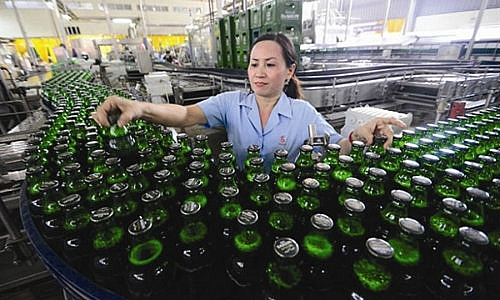Sabeco charged $110 million in tax arrears
 |
| The $110 million is leftover undeclared profit from 2016 |
Notably, according to the report of the State Audit Office submitted to the Ministry of Industry and Trade (MoIT), as of December 31, 2016, Sabeco held more than VND2.8 trillion ($122.99 million) in profit after which it had not declared tax.
In the first quarter of 2017, VND76 billion of this VND2.8 trillion ($122.99 million) was divided among several funds. Thus, the remaining undeclared profit of Sabeco was more than VND2.7 trillion ($118.6 million).
As 89.59 per cent of Sabeco was owned by the state before selling 53 per cent of this to Thai Beverage, the state audit proposed MoIT to collect VND2.5 trillion ($109.8 million) to the state budget.
Along with the tax arrears, the state audit asked MoIT to consider the responsibility of the board of directors and individuals in not declaring the real profits of the corporation.
| According to the audited financial results, Sabeco suffered a loss of VND445 billion ($19.54 million) from investing in banking, stocks, as well as pouring money into financial investment funds. |
According to the audited financial results, Sabeco suffered a loss of VND445 billion ($19.54 million) from investing in banking, stocks, as well as pouring money into financial investment funds.
Besides, the state audit found that Sabeco had committed violations in paying the bonus of the board of directors. Notably, in the fiscal year of 2015 Sabeco spent over VND15 billion ($658,927) on the bonuses of the chairman of the board of directors, the general director, the deputy general director, the head of the controlling board, and the chief accountant, exceeding regulations by VND13 billion ($571,070).
This is not the first time that Sabeco has had to pay tax arrears.
Previously, in July 2015, the state audit submitted documents to the Ministry of Finance (MoF) proposing the collection of VND408 billion ($18.7 million) in special consumption tax arrears for 2013.
After auditing the corporation, the office found that Sabeco has been evading taxes for years by establishing ten regional trading companies where it owned 90-94 per cent of the shares. Sabeco would distribute products at low prices to Sabeco Trading Company, which would then be distributed to regional trading companies at a higher price before being sold to other distributors and wholesalers.
However, at the time, Phan Dang Tuat, chairman of Sabeco, told Vneconmy that there is no practical basis for the proposal of the State Audit Office because excise tax is supposed to be levied on producers, not traders. Furthermore, using the selling price of regional trading companies can lead to double taxation, as it applies value added tax.
Tuat added, if the final decision of the state audit, MoIT, and the General Department of Taxation is that Sabeco must pay tax arrears, then it will do so.
In addition, in November 2016, the government inspector proposed MoF to collect nearly VND2.5 trillion ($109.8 million) in the special consumption tax from Sabeco.
What the stars mean:
★ Poor ★ ★ Promising ★★★ Good ★★★★ Very good ★★★★★ Exceptional
 Tag:
Tag:
Related Contents
Latest News
More News
- Shopee and TikTok Shop account for 8 per cent of Vietnam’s retail market (January 16, 2026 | 00:00)
- Human-centred governance seen as key to AI development (December 19, 2025 | 18:19)
- TECHFEST Vietnam 2025 links startups with policy and capital (December 15, 2025 | 18:21)
- Long Thanh International Airport welcomes first Vietnam Airlines test flight (December 15, 2025 | 18:01)
- Foreign fruits flood Vietnamese market (December 09, 2025 | 13:22)
- Vietnam’s fruit and vegetable exports reach $7.8 billion in first 11 months (December 05, 2025 | 13:50)
- Vietnam shapes next-generation carbon market (November 26, 2025 | 15:33)
- PM urges Ho Chi Minh City to innovate and remain Vietnam’s economic locomotive (November 26, 2025 | 15:29)
- Experts chart Vietnam's digital finance path: high hopes, high stakes (November 14, 2025 | 10:56)
- Vietnam’s seafood imports surge 30 per cent in first 10 months (November 10, 2025 | 19:35)


























 Mobile Version
Mobile Version